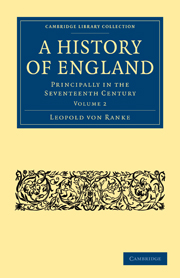Book contents
- Frontmatter
- Contents
- BOOK VI GOVERNMENT IN ENGLAND WITHOUT THE PARLIAMENT. TROUBLES IN SCOTLAND
- BOOK VII CONNEXION BETWEEN THE TROUBLES IN SCOTLAND AND THOSE IN ENGLAND AND ELSEWHERE
- BOOK VIII THE LONG PARLIAMENT AND THE KING, DOWN TO THE OUTBREAK OF THE CIVIL WAR
- INTRODUCTION
- CHAP. I Summoning of the Parliament
- CHAP. II The first sittings of the Long Parliament
- CHAP. III Progress of aggressive tendencies in the Lower House
- CHAP. IV Attempt at a Reaction
- CHAP. V Parliamentary and popular agitation. Execution of Strafford
- CHAP. VI Concessions and new demands
- CHAP. VII Charles I in Scotland
- CHAP. VIII Days of the Grand Remonstrance
- CHAP. IX Formation of a new Ministry. Tumultuous agitation in the Capital
- CHAP. X Breach between the King and the Parliament
- BOOK IX THE ENGLISH CIVIL WAR, 1642—1646
- BOOK X INDEPENDENTS AND PRESBYTERIANS. FATE OF THE KING
CHAP. I - Summoning of the Parliament
Published online by Cambridge University Press: 07 June 2011
- Frontmatter
- Contents
- BOOK VI GOVERNMENT IN ENGLAND WITHOUT THE PARLIAMENT. TROUBLES IN SCOTLAND
- BOOK VII CONNEXION BETWEEN THE TROUBLES IN SCOTLAND AND THOSE IN ENGLAND AND ELSEWHERE
- BOOK VIII THE LONG PARLIAMENT AND THE KING, DOWN TO THE OUTBREAK OF THE CIVIL WAR
- INTRODUCTION
- CHAP. I Summoning of the Parliament
- CHAP. II The first sittings of the Long Parliament
- CHAP. III Progress of aggressive tendencies in the Lower House
- CHAP. IV Attempt at a Reaction
- CHAP. V Parliamentary and popular agitation. Execution of Strafford
- CHAP. VI Concessions and new demands
- CHAP. VII Charles I in Scotland
- CHAP. VIII Days of the Grand Remonstrance
- CHAP. IX Formation of a new Ministry. Tumultuous agitation in the Capital
- CHAP. X Breach between the King and the Parliament
- BOOK IX THE ENGLISH CIVIL WAR, 1642—1646
- BOOK X INDEPENDENTS AND PRESBYTERIANS. FATE OF THE KING
Summary
It seemed to be going back to an ancient long-forgotten state of things, when in the English Privy Council, which continued its sittings in the King's absence, and was anxiously discussing means of escape from existing difficulties, the Earl of Manchester, Lord Privy Seal, a man of great age and strong sense, though somewhat too fond of precedent, proposed to renew at this juncture the old institution of the Magnum Concilium, which had preceded the formation of Parliament. He recalled the times when the advice of the peers, as the born counsellors of the King, had roused the nation to great efforts. The objection was urged that no assembly of the kind had taken place for fully three hundred years: moreover that it would merely be leading indirectly to what the Scots had demanded, the summoning of a Parliament. Archbishop Laud did not like the prospect, but, considering the probable results of calling a Parliament, declared for the assembly of peers. The King without hesitation accepted the proposal, and on September 7 issued writs, whereby he summoned the Peers of the realm to York, ‘to take counsel with them about weighty and serious matters touching the condition of the kingdom.’
The nation however was not satisfied; and the first cry for the immediate convocation of a Parliament arose from among the nobility themselves.
The government was somewhat alarmed to find that without their previous knowledge a considerable number of peers about this time assembled in London, most of whom were known to be bitterly hostile to the existing régime.
- Type
- Chapter
- Information
- A History of EnglandPrincipally in the Seventeenth Century, pp. 216 - 224Publisher: Cambridge University PressPrint publication year: 2010First published in: 1875



